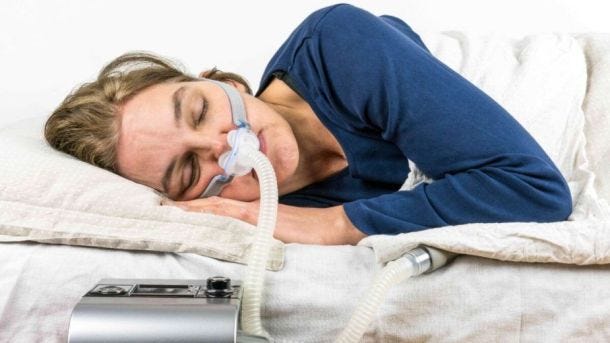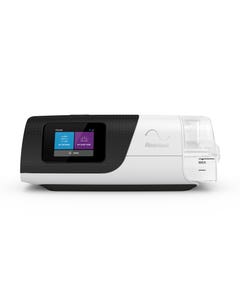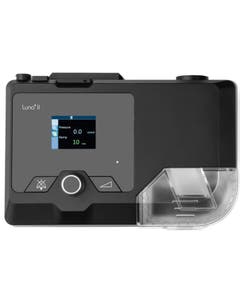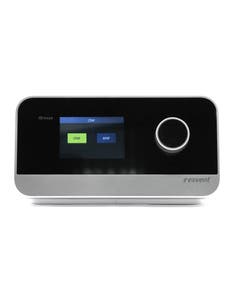Sleep Sounder Even With Sleep Apnea
So your doctor says you have sleep apnea. Your doctor probably recommended the nightly use of a CPAP machine, which is the number one treatment for this disorder. With the use of your CPAP machine every night you should see an improvement in how you sleep and how you feel in the morning. However, there are a number of things that you can do to improve your sleep and to improve your sleep apnea in conjunction with the use of your CPAP machine.
Weight loss
Unless you are extremely overweight, usually weight loss is not enough to entirely eliminate your sleep apnea. But, it can certainly help. Weight loss is believed to improve sleep apnea by changing the shape of the airway which decreases the probability of airway collapse.
Avoid Alcohol Before Bed
Alcohol tends to relax the muscles in the airway which will worsen your snoring and sleep breathing issues. If you insist on drinking, allow yourself sufficient time for your blood-alcohol level to decrease to zero before going to bed.
Sleep on Your Side
Many married couples will have already figured this one out - each time your partner wakes you up and tells you to roll over. Sleeping on your back increases the chance of airway collapse due to gravity's effect on the jaw and tongue. Sleeping on your side helps to eliminate this problem.
Elevate Your Head
Many sleep apnea patients notice that they sleep better when in a recliner. Just like side-sleeping, elevating your head helps to decrease the effect of gravity on your airway. It will improve your sleep apnea and overall sleeping experience. Elevating the head of your bed just 30-60 degrees can improve your sleep and chance of having apnea episodes.
Talk to Your Dentist
I know this one sounds strange, but many people that use nightly dental appliances such as mouthpieces have found that the use of these items increase their snoring and apnea episodes. Talk to your dentists about other forms of dental treatment that may not interfere with your sleeping and sleep apnea.
Quit Smoking
Smoking increases the inflammation and fluid build-up in the upper airway reducing its size, leading to a higher risk of airway collapse. This risk usually decreases after quitting smoking.
Open Your Nose
Keep your nasal passages open at night with the use of nasal sprays or allergy medicines.
Maintain Regular Sleep Hours
Sleep deprivation is believed to be linked with both prolonging sleep problems while you're sleeping, as well as decreasing the chance that you will awake from those problems. So get your sleep!
Strengthen Your Muscles
By strengthening your airway muscles with exercises you can decrease your chance of an airway collapse. Singing with a vocal instructor is a great way to strengthen your airway muscles, or you can try a technique called Didgeridoo therapy.
Breathe Rite Strips
The use of External Nasal Dilation or Breath Rite Strips may reduce the severity of your snoring but will probably not be effective at a sleep apnea treatment.
If you think that you have sleep apnea and have not yet seen a doctor, you should do so. Sleep apnea is a potential fatal disorder if gone untreated. If your doctor recommends that you should treat using a CPAP machine then DO IT! The above methods are not to be done instead of the use of a CPAP machine. Instead, use in conjunction with a CPAP machine to enhance your treatment of sleep apnea.
Key Takeaways
- While sleeping with CPAP therapy may be uncomfortable, there are numerous ways to get better sleep.
- A few tips for better sleep include losing weight, quitting smoking, and avoiding caffeine and alcohol before bed.
So your doctor says you have sleep apnea. Your doctor probably recommended the nightly use of a CPAP machine, which is the number one treatment for this disorder. With the use of your CPAP machine every night you should see an improvement in how you sleep and how you feel in the morning. However, there are a number of things that you can do to improve your sleep and improve your sleep apnea in conjunction with the use of your CPAP machine.
Tips for Better Sleep
Weight Loss
Unless you are extremely overweight, usually weight loss is not enough to entirely eliminate your sleep apnea. But, it can certainly help. Weight loss is believed to improve sleep apnea by changing the shape of the airway which decreases the probability of airway collapse.
Avoid Alcohol Before Bed
Alcohol tends to relax the muscles in the airway which will worsen your snoring and sleep-breathing issues. If you insist on drinking, allow yourself sufficient time for your blood-alcohol level to decrease to zero before going to bed.
Avoid Heavy Meals Before Bed
Eating a larger meal before bedtime can affect a person's sleep health and digestive system. It can even keep you up at night due to acid reflux, stomach pain, indigestion, and more. Experts recommend stopping eating at least 3 hours before falling asleep so that you are getting the proper sleep your body needs.
Avoid Caffeine Before Bed
Since caffeine is a stimulant, drinking it too close to bedtime can keep you awake at night. This could result in sleep deprivation and other issues as well. To avoid drinking too much caffeine each day, track your intake and also don't drink any caffeinated beverages too late in the day.
Sleep on Your Side
Many married couples will have already figured this one out - each time your partner wakes you up and tells you to roll over. Sleeping on your back increases the chance of airway collapse due to gravity's effect on the jaw and tongue. Sleeping on your side helps to eliminate this problem.
Elevate Your Head
Many sleep apnea patients notice that they sleep better when in a recliner. Just like side-sleeping, elevating your head helps to decrease the effect of gravity on your airway. It will improve your sleep apnea and overall sleeping experience. Elevating the head of your bed by just 30-60 degrees can improve your sleep and chance of having apnea episodes.
Keeping Noise to the Minimum Level
A quiet bedroom helps to make a more peaceful environment for sleeping. If you are one who needs to sleep with sound, having a an running or a white noise machine could be beneficial to getting a good night's sleep. If you'd like noise to stop bothering you, try using earplugs as you sleep.
Talk to Your Dentist
I know this one sounds strange, but many people that use nightly dental appliances such as mouthpieces have found that the use of these items increases their snoring and apnea episodes. Talk to your dentists about other forms of dental treatment that may not interfere with your sleeping and sleep apnea.
Quit Smoking
Smoking increases the inflammation and fluid build-up in the upper airway reducing its size, leading to a higher risk of airway collapse. This risk usually decreases after quitting smoking.
Open Your Nose
Keep your nasal passages open at night with the use of nasal sprays or allergy medicines.
Maintain Regular Sleep Hours
Sleep deprivation is believed to be linked with both prolonging sleep problems while you're sleeping, as well as decreasing the chance that you will awake from those problems. So get your sleep!
Take 20 Minute Naps in the Afternoon
Although napping too much is harmful to a good night's sleep, taking littler ones could be helpful. If you are tired and need a nap, keep it to a minimum time length, around 20 minutes.
Disconnect Electronic Devices Before Bed
Blue light emitting from tablets, smartphones, and other electronic devices actually can keep you up at night. That's because they suppress your bosy's natural production of melatonin. It is recommended to shut off all devices before falling asleep.
Strengthen Your Muscles
By strengthening your airway muscles with exercises you can decrease your chance of an airway collapse. Singing with a vocal instructor is a great way to strengthen your airway muscles, or you can try a technique called Didgeridoo therapy.
Set Your Alarm for the Same Time Everyday
Keeping your body on a normal sleeping pattern as much as possible will help with overall sleep quality and health. If you are constantly waking up at different times each day, your body will never get the proper quality of sleep. Choose a wake-up time that you know you can consistently keep, even on the weekends.
Breathe Rite Strips
External Nasal Dilation or Breath Rite Strips may reduce the severity of your snoring but will probably not be effective as a sleep apnea treatment.
If you think that you have sleep apnea and have not yet seen a doctor, you should do so. Sleep apnea is a potentially fatal disorder if left untreated. If your doctor recommends that you should treat sleep apnea with CPAP therapy and a CPAP machine then DO IT! The above methods should not be done using a CPAP machine. Instead, use it in conjunction with a CPAP machine to enhance your treatment of sleep apnea.








